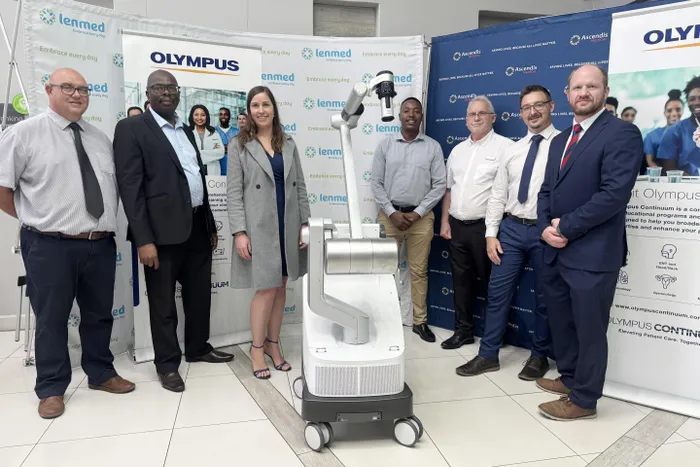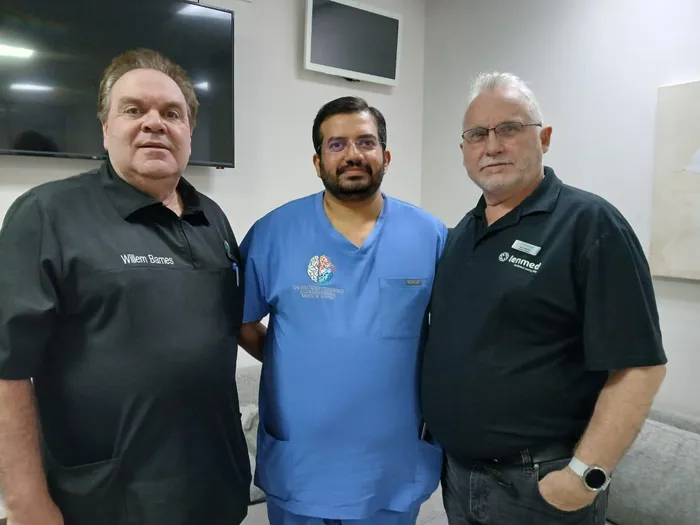Another first for Kimberley: Lenmed makes history with revolutionary surgical system

The Royal Hospital and Heart Centre has become the first hospital in Sub-Saharan Africa to acquire the ORBEYE Orbital Camera System - an innovation poised to redefine surgical precision and patient care. Pictured are (from left): Riaan Steenkamp (Clinical Applications Specialist Imaging Systems - Surgical Innovations), Ntokozo Moyo (Head of Sales - Surgical Innovations), Shanna Hiemstra (Olympus Market Development Manager - South Africa), Bonke Mankwana (Technology Manager - Lenmed Royal Hospital & Heart Centre), Jan Scheepers (Hospital Manager - Lenmed Royal Hospital & Heart Centre), Riaan Engelbrecht (Product Manager - Surgical innovations), and Raymond Hiscock (Sales Representative - Surgical Innovations).
Image: Supplied
IN A GROUNDBREAKING move, the Lenmed Royal Hospital and Heart Centre in Kimberley has become the first hospital in Sub-Saharan Africa to acquire the ORBEYE Orbital Camera System - an innovation poised to redefine surgical precision and patient care.
For years, surgeons have relied on conventional imaging technology to navigate delicate procedures, but with the arrival of the ORBEYE system, those days are quickly becoming a thing of the past. Boasting cutting-edge 4K 3D imaging, the ORBEYE provides unparalleled resolution and depth perception, offering surgeons a level of clarity that was previously unimaginable.
At the heart of this medical milestone is Dr Thomas, a leading surgeon at the Lenmed Royal Hospital and Heart Centre, who has championed the adoption of this advanced technology.
“The ORBEYE system is a game-changer in surgical precision,” Thomas said, his enthusiasm unmistakable. “The ability to visualise critical structures in such high definition significantly reduces surgical risks and enhances patient outcomes. This technology allows us to operate with more accuracy than ever before.”
Unlike traditional surgical microscopes, the ORBEYE system enables an entire surgical team to see exactly what the lead surgeon sees, fostering a more synchronised and collaborative environment.
This shared visualisation capability is particularly beneficial in intricate fields such as neurosurgery, ENT, vascular surgery, and microsurgery - areas where precision is paramount.
For patients, the advantages of this technology are life-changing. With enhanced imaging comes greater accuracy, which translates to reduced surgery times, fewer complications, and improved recovery rates.
By minimising potential risks, the ORBEYE system ensures better post-surgical results, providing patients with peace of mind and the highest standard of care.

Willem Barnes, theatre manager; Dr Antony Thomas, neurosurgeon; and Jan Scheepers, hospital manager.
Image: Supplied
Jan Scheepers, hospital manager at Royal Hospital and Heart Centre, emphasised the broader impact of this investment. “We are incredibly proud to be at the forefront of surgical innovation in South Africa,” he stated. “Acquiring the ORBEYE Orbital Camera System aligns with our mission to provide world-class medical care to our Northern Cape communities. By integrating cutting-edge technology, we are setting new benchmarks in surgical precision and patient safety.”
The Royal Hospital and Heart Centre’s decision to invest in the ORBEYE system underscores its dedication to staying ahead of medical advancements. As part of the Lenmed Group - a health-care network with a presence in Southern Africa, Ghana, and the United Arab Emirates - the hospital aims to lead the charge in medical innovation, ensuring that patients in the Northern Cape and beyond receive top-tier surgical care.
As the first in Sub-Saharan Africa to utilise this transformative technology, the Royal Hospital and Heart Centre is not just making history - it’s helping to shape the future of surgery.
Related Topics: